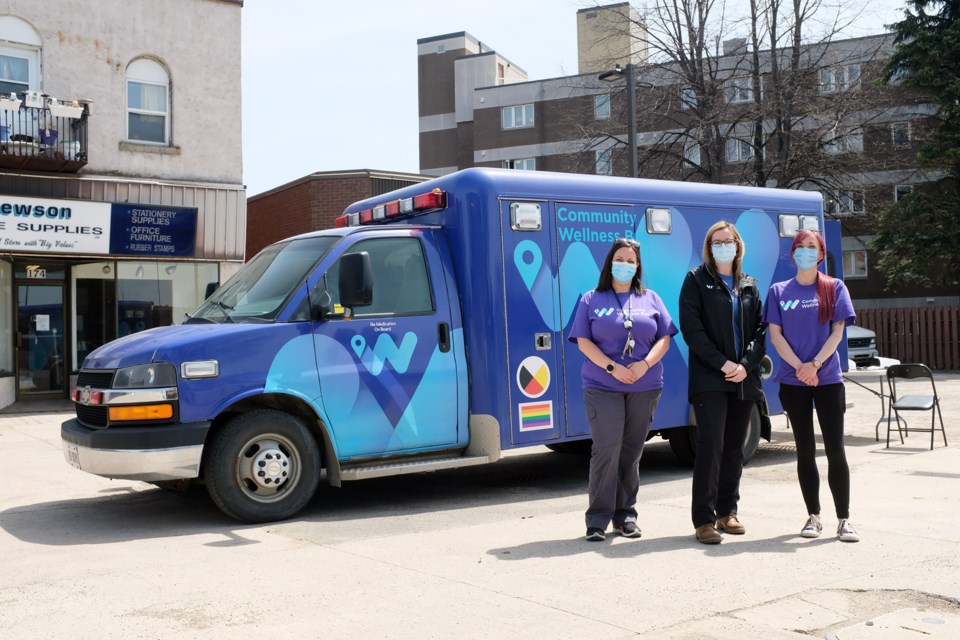After operating for two years on a shoestring budget — and now facing a possible loss of funding for peer support workers in the near future — the leadership behind the Community Wellness Bus is reaching out for help to keep the project sustainable.
The Community Wellness Bus is a true community project bringing together resources from many of the local agencies and organizations in the Sault that work with people experiencing homelessness, drug addiction and mental health challenges.
In its two years in operation, the bus has tallied over 11,000 visits across 10 sites in Sault Ste. Marie. Its current schedule includes four regular stops every week for a total of 10 hours.
People who use the service may take food and hygiene products, harm reduction supplies or seek basic medical care. The idea is to meet the clients where they are at, because many clients of the bus will not seek traditional medical care in a clinical setting.
“That’s understandable, the trust isn’t there,” said Annette Katajamaki, CEO of CMHA Algoma (CMHA).
CMHA Algoma and Sault Area Hospital (SAH) are the lead partners for the Community Wellness Bus, with Algoma Family Services, Social Services and Superior Family Health Team rounding out the list of core partners.
The staff on the bus offer low-barrier, nonjudgmental access to health care and social care for people unlikely to seek out care through conventional means.
“We know we have to engage people on the street we would never have access to in the office because they won’t come,” said Katajamaki.
The project was launched in 2021 with next to no funding, just the contributions of concerned community partners. For example, a decommissioned ambulance was donated by Social Services, nursing staff provided by SAH, as well as peer support workers from CMHA.
Those peer support workers bring lived experience of living with addiction and are an integral part of the service, said Katajamaki.
“That’s the real importance of peer support workers: they just talk to them in a way I can’t talk to them, because they have been there and they understand them,” Katajamaki said.
Three-year federal funding that supported the hiring of peer support workers is set to lapse in six weeks, said Katajamaki. To date, there is currently no call from the federal government for an extension of the funding.
The peer support workers are employed on the Community Wellness Bus, but also with the currently paused Concurrent Disorders Day Treatment Program and other local supports, said Lisa Case, SAH director of Clinical Programs, Mental Health & Addictions.
She said losing the funding for those workers will have a substantial impact on many of the services being offered in the city.
“These are paid peer support workers who are equitably compensated for their knowledge, skill and ability. That feels different than just asking someone to donate their time,” said Case.
Another challenge is keeping the bus on the road. As an aging former ambulance, the Community Wellness Bus has at times been unavailable due to repairs.
On Friday, the Algoma Ontario Health Team and its partners hosted a lunch and learn at the Canadian Bushplane Heritage Centre, inviting local agencies who deal with people living with addiction, mental health and homelessness challenges. They learned more about the Community Wellness Bus and were asked to consider ways in which their organization can support it and keep it sustainable.
“We are all very passionate about the work and we know we are making a difference, it has taken a few years to actually see those results. But we can do more,” said Katajamaki.
Among the invited organizations and agencies was the City of Sault Ste. Marie, Algoma Family Services, Ontario Provincial Police, John Howard Society, SOYA, and Nogdawindamin Family & Community Services, among others.
Katajamaki said the Community Wellness Bus has received incredible community support, but after two years in service is looking for more partnerships to help continue serving the community and possibly expand its offerings.
“No one program or service is going to change what is happening in our community, but if we all band together and if our community actually accepts these people need help and aren’t villains in all of this, that’s a huge step as well,” said Katajamaki.
